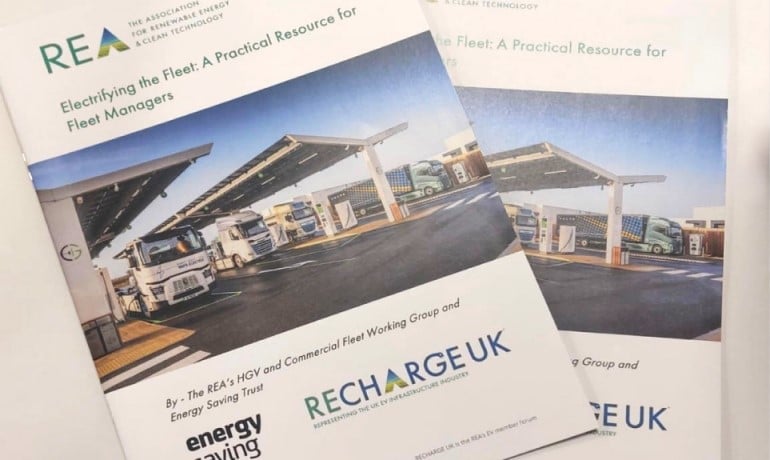In partnership with the Energy Savings Trust, the Association for Renewable Energy and Clean Technology (REA) has published a new resource to provide commercial vehicle fleet managers with a detailed roadmap to electrifying their fleets.
The whitepaper, Electrifying the Fleet: A Practical Resource for Fleet Managers, demonstrates the value-for-money and efficiency savings that an electrified fleet offers and provides insights into overcoming the current barriers to adoption.
According to the paper, which was developed by the REA’s HGV and commercial fleet working group, fleet managers can expect to save about £1,500 annually per light commercial vehicle (LCV) driving 15,000 miles a year if charged at the depot or at home.
For rigid HGVs (meaning that the cargo-carrying body is permanently attached to the cab) driving the same distance, the savings could reach £3,500 annually. These savings are attributed to the fact that electric vehicles (EVs) only require 25-30% of the energy that their diesel equivalent would need to deliver the same performance.
As things currently stand, UK policy targets include a mandate that 10% of new van sales in the UK must be zero emissions by 2024, rising to 58% by 2029, 70% by 2030 and 100% by 2035.
For HGVs, all new models sold must be zero emission by 2040. The whitepaper covers end to end logistics fleets, last mile and mobile engineering fleets and local and regional transport authority fleets – all of these will need to adjust in line with government policy.
It highlights the Society of Motor Manufacturers and Traders (SMMT)’s report from November 2023 that the UK only had one HGV charging facility, identifying government support mechanisms that are available to enable fleet managers to make the switch.
Mechanisms for vans differ depending on the weight of the vehicle: plug-in grants for small vans weighing under 2,500kg provide up to £2,500 discount, with the grant for large vans applicable to vehicles between 2,500kg and 4,250kg.
Small trucks qualify for an up to £16,000 plug-in grant and £25,000 is available for large trucks. The grants all offset the upfront costs associated with electrification.
The REA’s report sets out key considerations in electrifying a depot, including fleet analysis, site design and pre-meter power enabling, and operational integration. It touches on the potential of smart charging to reduce the need for grid upgrades and efficiency upgrades.
According to Matthew Adams, transport policy manager at the REA, who headed the effort to compile the resource, said: “The REA, with its diverse membership, is uniquely positioned to take an authoritative stance on fleet electrification. This resource provides a proven, well-managed process for fleet managers considering electrification, offering significant savings on fuel costs and helping fleets achieve their ESG targets.”
The UK future of roads minister, Lilian Greenwood, added: “Our roads are undergoing a technological revolution, and fleets will play a big part. A cleaner greener transport network is a key priority for this Government, which is why we have plug-in grants available for vans and trucks and programmes aimed at scaling up zero emission HGVs, to decarbonise road freight. The REA and Energy Saving Trust’s new resource is a great step on our path to net zero.”






